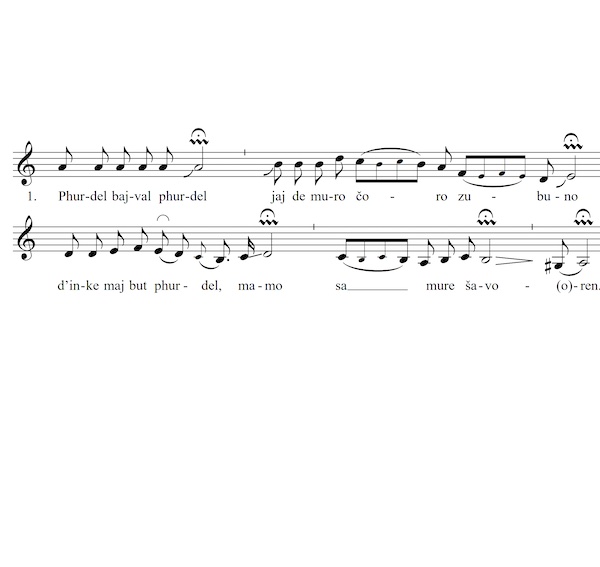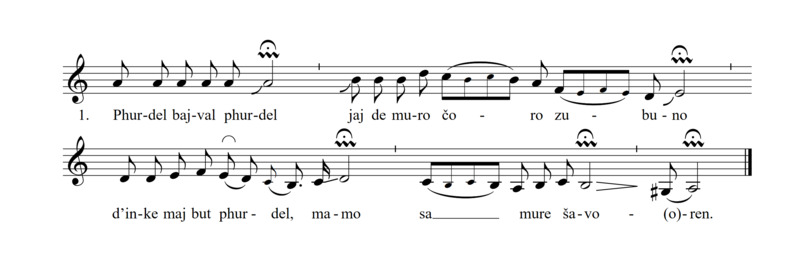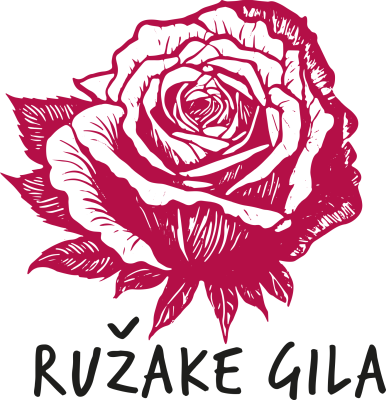
Phurdel bajval phurdel
- Genre
- langsames Lied
- Thema
- Klagelied
- DOI
- doi.org/10.21939/kg8k-yd82
Contents
Recordings
In this song, a man complains about his poverty. He is ashamed that he cannot support his family. The mother of his children has died. A girl would like to marry him, but he refuses because he can neither provide for his children nor a wife.
Musical transcription based on the booklet accompanying the CD Amare gila - Unsere Lieder / Our Songs
Phurdel bajval phurdel is an old, melancholic song about a sad event. In the tradition of Lovari songs, a true event is told poetically and passed on in this way. Ruža Nikolić-Lakatos loved to sing this song. It is the basis for Phurde bajval phurdel, which she wrote for the survivors of the Oberwart terrorist attack in 1995.
This recording was made during the celebrations for Ruža Nikolić-Lakatos' birthday in 1993. The guests, including the singer's brother Fasoš Lakatos and her mother, sing along to the end of the lines.
Commentary
(GERMAN ONLY) Ruža Nikolić-Lakatos explains the content and meaning of Phurdel bajval phurdel to ethnomusicologist Ursula Hemetek as part of her field research. The recording reflects the methodological approach: in an informal setting, the singer and the researcher agree on a translation of the lyrics and a coherent representation of the song.
(GERMAN ONLY) One can hear Ursula Hemetek's introduction to Phurdel bajval phurdel during a concert by Ruža Nikolić-Lakatos and Mišo Nikolić at the Interkulttheater on October 9, 1993.
Lyrics
Stanza 1
| Phurdel bajval, phurdel | The wind blows, it blows |
| jaj de muro čoro zubuno. | through my torn jacket. |
| D’inke maj but phurdel, mamo, | It blows even more, mother, |
| sa mure šavoren. | over my children. |
Stanza 2
| Xasajlem-tar, Devla, | I have perished |
| jaj de nagjon tenkre gelem hej, | and I am lost, God. |
| De xasajlem-tar aba, mamo, | I am lost, mother, |
| jaj de či sama či lem la. | I was not careful. |
Stanza 3
| So kero ma Devla? | What should I do, God, |
| Jaj de ka šo muro šero hej? | where do I lay my head? |
| Jaj de bare čorimastar, phrali, | in the great misery |
| jaj de la bara brigatar. | in the great sorrow? |
Stanza 4
| Apal phendas: | Again, he said: |
| Phurde bajval, phurde, | Blow, wind, blow |
| jaj de paj kopača e patra hej, | the leaves from the trees, |
| te šaj šeraven ma tele | so that they may cover me, |
| jaj de do milaske patra. | the leaves of two summers. |
Stanza 5
| Phendem tuke, čore, | I told you, girl, |
| jaj de na phir pala mande hej. | don’t run after me. |
| Pala mande phires, šeje, | If you run after me, |
| č’avesa tu muri. | you will never be mine. |
Stanza 6
| Av-tar manca, čore, | Come with me, girl, |
| jaj de ž‘ando kavehazo hej, | to the coffee house, |
| jaj de kote pheno tuke, šeje, | there I will |
| so-j de muro gindo. | tell you my thoughts. |
Stanza 7
| Apal žo-tar mange | I will go away |
| de erekre me žo-tar hej, | I will go away forever, |
| jaj de kaj man či pinžarna, šeje | where nobody knows me, |
| či Rom taj či gaže. | no Romani man and no gažo. |
Stanza 8
| Apal inke jokhar: | Again, he said: |
| Phurdel bajval, phurdel | The wind blows, it blows |
| de muro čoro zubuno | through my torn jacket. |
| jaj de inke maj but phurdel, mamo, | It blows even more, mother, |
| sa mure šavoren. | over my children. |
| Sa tumara patjivake! | In your honour! |
Zitierempfehlung anzeigen
Bitte zitieren Sie diese Seite wie folgt:
Music and Minorities Research Center, "Phurdel bajval phurdel", Ružake gila, zuletzt besucht am Loading date..., doi.org/10.21939/kg8k-yd82


